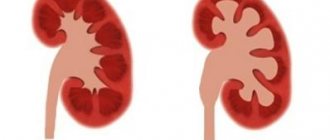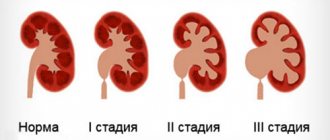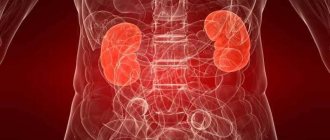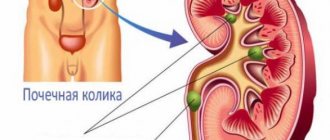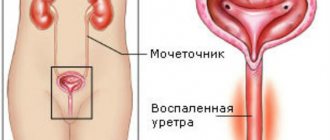Consultation with a nephrologist – 1,750 rubles.
- What is pyelonephritis?
- Causes of the disease
- Symptoms
- Features of pyelonephritis in men and women
- Treatment
- Pyelonephritis during pregnancy
Pyelonephritis
is a kidney disease that has a bacterial basis. Due to the occurrence of this disease, inflammatory processes begin to occur in the human body, most often affecting one kidney.
It can occur in acute or chronic form , accordingly, sometimes it is difficult to identify. Most often, women are affected by pyelonephritis, but in old age the percentage of affected men increases.
What is kidney polyneuritis?
Nerve endings act as transmitters throughout the human body. Since everything is controlled by the brain, a high-quality signal from and to it is extremely important. Without it, the organ will not work correctly or will gradually fail altogether, turning the situation into a deadly one for the patient.
With polyneuritis, the kidneys lose full communication with the nervous system and cease to perform their function correctly. Since the excretory system is very important for the body, this can end very sadly if treatment is not started in time.
IMPORTANT! There are no nerve endings in the internal tissue of the kidneys, that is, their main component. With polyneuritis, the outer shells of the organ suffer, through the endings of which the nerve connection is made.
Advanced polyneuritis will lead to complete destruction of the excretory system, causing the patient severe inconvenience, pain, and also constantly causing harm to other organs and systems of the body.
Causes of kidney polyneuritis
The kidneys are busy cleaning out the waste produced by the body constantly. They work almost in heart mode, in large quantities and volume. Therefore, there are many reasons why this disease can affect them - both external and internal.
Very often, kidney polyneuritis manifests itself as a complication against the background of other diseases. Even if the patient is aware of them and deals with them, many of the kidney diagnoses are chronic. It is not easy or even impossible to cure them - just keep them within the acceptable limits with medications. It is precisely against the background of such long-term diseases that polyneuritis usually develops. The risk of dysfunction of nerve endings is greatest if a person is sick with diseases of an oncological or endocrine nature.
Genetics is important. If many of the older generation in the patient’s family suffer from kidney disease, then he is at risk. It would be reasonable to put as little stress on the kidneys as possible, and with them the excretory system as a whole, have them checked regularly and not be indifferent to the prevention of the disease.
An infection that reaches the kidneys during its “journey” through the body often affects nerve endings. Such diseases take the longest to be detected, as they may not be immediately visible due to the fact that other organs and systems do not respond to them.
Other possible reasons:
- Lack of vitamins and nutrients, mainly vitamin B (the deficiency must reach a critical level);
- Local hypothermia (lower back, pelvic area);
- Poisoning with heavy chemicals (lead, arsenic, mercury, etc.);
- High level alcohol intoxication;
- Overdose of antibiotics (some affect nerve endings);
- Physical injuries in the kidney area or simply in the abdominal cavity.
IMPORTANT! Infectious diseases of the genitourinary system that begin in the lower canals (mainly urethral) can also cause polyneuritis if they reach the kidneys before treatment.
Treatment of pyelonephritis at SM-Clinic
- Treatment is carried out according to evidence-based medicine protocols, we achieve recovery in the shortest possible time and do not burden the body with useless medications.
- Acute pain syndrome is effectively relieved.
- Complex therapy is prescribed so as not to dull the symptoms, but to ensure the elimination of the pathology.
- For acutely ill patients, home care and 24-hour hospital care are available.
To receive prompt, qualified help, make an appointment with a nephrologist online.
Symptoms of kidney polyneuritis
Diseases of the kidneys and the excretory and genitourinary systems in general are difficult to miss. Most of them cause severe acute or dull pain, which must be dulled with analgesics, interfere with urination, and poison other abdominal organs with unprocessed waste. The symptoms of kidney polyneuritis are no less noticeable and unpleasant. The main symptoms include:
- nausea and vomiting;
- muscle weakness and general weakness, fine motor skills may be impaired;
- swelling of the extremities (due to impaired fluid removal - this responsibility also partially lies with the kidneys);
- frequent numbness of the limbs;
- changes in the sensitivity of the whole organism to temperature and its fluctuations;
- pain in the lumbar region, may radiate higher up the spine or into the abdominal cavity;
- increased sweating;
- “marbling” of the skin (disturbance in the color of the skin, the main feature is a characteristic vascular pattern similar to the texture of marble)
All these symptoms already indicate seriously developed polyneuritis, since the initial stages of the disease pass unnoticed by a person. If you have identified at least a few of the above, immediately consult a doctor before non-functioning kidneys harm the rest of the body.
What becomes the root cause of the disease?
As already mentioned, girls or women are more likely to suffer from pyelonephritis. This is associated with another ailment - cystitis , after which kidney problems begin to appear.
Also, an infection of this kind can be caused by various accompanying bacteria, for example, E. coli. Microorganisms travel through the urinary tract, which connects the bladder and kidneys, and thus reach their destination - the kidneys. In women, the urethra is shorter, so it is easier for bacteria to reach their target. Men also become at risk after suffering prostate adenoma. Due to the disruption of urinary outflow, it becomes easier for bacteria to multiply.
And, of course, pyelonephritis affects people with reduced immunity , patients with diabetes, as well as those with a genetic predisposition to the disease, or hormonal problems.
Diagnosis of kidney polyneuritis
Any therapy should begin with a specialist diagnosis. Even if you are absolutely sure of your diagnosis, you will still have to undergo a series of effective and accurate tests with the participation of specialists. Based on the results of the analysis and examinations, your attending physician will be able to determine the stage of development of polyneuritis, assess the damage that has already been caused, and ultimately prescribe the necessary treatment.
To begin with, you will be asked to take laboratory tests of blood and urine. The samples obtained will be examined and will confirm or refute some of the causes of polyneuritis in your case. Also, general clinical tests help doctors see the overall picture of the body, understand how healthy it is and which organ systems are in the worst condition.
You will definitely be referred to an endocrinologist, one of the main specialists in this diagnosis. Depending on the severity of your case, an endocrine system examination will be ordered. Also, if the test results are suspicious, or the ultrasound image looks bad, the patient is referred for oncological examinations.
An ultrasound examination of the abdominal cavity is a safe and painless way to find out as accurately as possible all the features of the course of the disease. Based on the image, you will be seen by your primary care physicians, and you will have to present it frequently.
Electromyography is also prescribed, but this procedure is used rather to monitor the progress of therapy and track its results. Only timely and high-quality diagnosis ensures the start of effective treatment, so this stage should be approached with full responsibility and in no case be delayed.
Treatment of kidney polyneuritis
Depending on the severity of the disease, the patient may be admitted to a hospital or offered outpatient treatment. In any case, treatment must be comprehensive and continuous in order to prevent the disease from further damaging the body.
Drug treatment
Treatment of kidney polyneuritis depends entirely on the general condition of the patient at the time of its onset, as well as on the root cause that caused the disease. For example, if polyneuritis began against the background of vitamin deficiency, the patient, in combination with other elements of treatment, will be prescribed a course of appropriate vitamins. For bacteriological infections, which happens a little less frequently than other causes, antibiotics have to be prescribed to mitigate their strong effect, which is dangerous for the patient’s weakened body.
If the cause is intoxication of any kind, the body first needs to be cleansed. Under the supervision of doctors, the patient receives all the necessary medications and only after complete disposal of the toxin begins the process of restoring the nerve endings on the membranes of the kidneys. To destroy the infection, special courses of drugs such as Hexamine (4%) and Trypaflavin (1%) are prescribed.
Diuretics are required to take. Since the kidneys are not able to remove fluid as the body needs, it is necessary to additionally stimulate urination in order to prevent the accumulation of fluid, which causes swelling and additional poisoning of the body with stagnant urine.
IMPORTANT! Renal polyneuritis disrupts the metabolism in the human body, so it must be maintained throughout the course of treatment, as well as during rehabilitation. For these purposes, medications containing magnesium, calcium and potassium are prescribed.
Drug treatment under the supervision of specialists lasts for at least 2-3 months. It is very important to complete the entire course, otherwise everything will be in vain. You should follow your doctor’s instructions even after completing the official course of therapy. About three more months after completion of treatment for polyneuritis are considered a rehabilitation period, during which it is recommended to exercise no less caution.
Traditional medicine
Alternative medicine in the treatment of kidney polyneuritis relies on natural diuretics, which should “wash out” the infection or other cause of the disease in a natural way. Also popular are decoctions that strengthen the body, activate the immune system and normalize metabolism. If you have a serious form of the disease or folk remedies do not have any positive effect, then it is time to see a doctor before it is too late.
IMPORTANT! People believe that the best remedy for kidney disease is heat, bed rest and warm drinks. A good result is stable sweating after drinking or sleeping, frequent urge to go to the toilet, and disappearance of swelling over time.
Popular decoctions for the treatment of kidney polyneuritis (all should be drunk warm):
- Raspberry decoction . You need leaves and stems of the plant - pour boiling water over them in the proportion of 1 tbsp. l. raspberries/200 mg. water. You need to drink before meals, exactly 50 mg.
- Herbal tea "Ivan-chai" . It is necessary to brew one tablespoon per half liter of water and leave for at least eight hours. Drink in unlimited quantities instead of regular tea (regular tea can not be excluded).
- Tea from nettle and birch leaves is brewed to stabilize the body and so that the metabolism, destroyed by the disease, improves as soon as possible.
Warm baths are also recommended. You can use ordinary ones, without adding herbs and other things, but you can add leaves or whole shoots of nettle to the already filled water - it is believed that it has disinfectants.
Treatment of infection
Treatment of pyelonephritis should be comprehensive, including a special diet. In case of kidney disease, it is necessary to eat low-fat foods, avoid fried, spicy, and excessively salty foods. It is also prohibited to consume all foods that are bright red in color.
When treating kidneys, antibiotics are mainly prescribed, and the patient must undergo a full course of treatment in order to completely destroy the bacteria inside his body. Painkillers are also prescribed for severe pain.
For acute symptoms, bed rest is indicated. After normalization of the condition, moderate physical activity is recommended to restore urine evacuation. For chronic pyelonephritis, the treatment regimen is strictly individual and selected by the attending physician.
Pyelonephritis during pregnancy
Pyelonephritis is extremely dangerous for the mother and fetus, and therefore requires immediate and effective treatment. The therapeutic regimen for the acute form of the disease includes:
- gentle antibiotics (in this case their use is more than justified);
- uroseptics;
- antispasmodics;
- painkillers;
- positional exercises for normal urine drainage;
- restorative therapy - vitamin therapy, herbal medicine, taking sedatives;
- physiotherapy, detoxification, catheterization - individually according to indications.
Unfortunately, pyelonephritis can become chronic . Therefore, after successful treatment, it is necessary to undergo regular preventive examinations. SM-Clinic makes it possible to cure pyelonephritis and help prevent its reoccurrence.
Complications of kidney polyneuritis
Since polyneuritis disrupts the basic function of the kidneys, their supply of blood, and therefore air and other necessary substances, also fails. Any organ without proper supply is susceptible to inflammatory processes.
The inflammatory process of the kidneys, in turn, can result in necrotic processes. Completely or partially destroyed kidneys will begin to die, poisoning the entire abdominal cavity with waste from all parts of the body, as well as their own. Necrotic processes can most often be stopped only by surgery.
The contents of the kidney may be released into the abdominal cavity. This is very dangerous because the waste is toxic and other organs around can be damaged. This problem is also solved by surgical intervention, and urgently.
